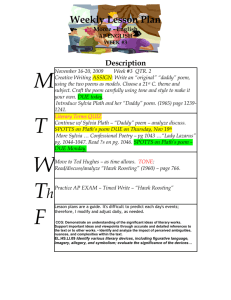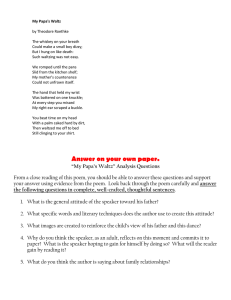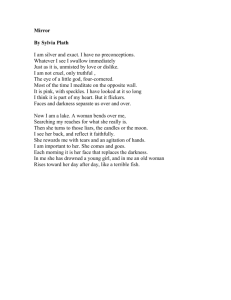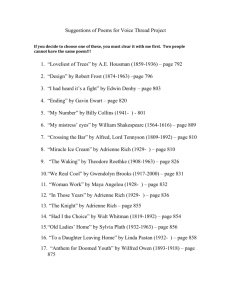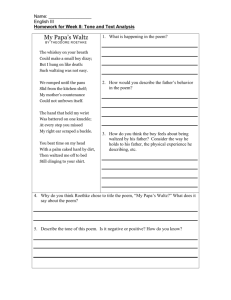Click here for draft one - Dalia Lozano - Eportfolio
advertisement
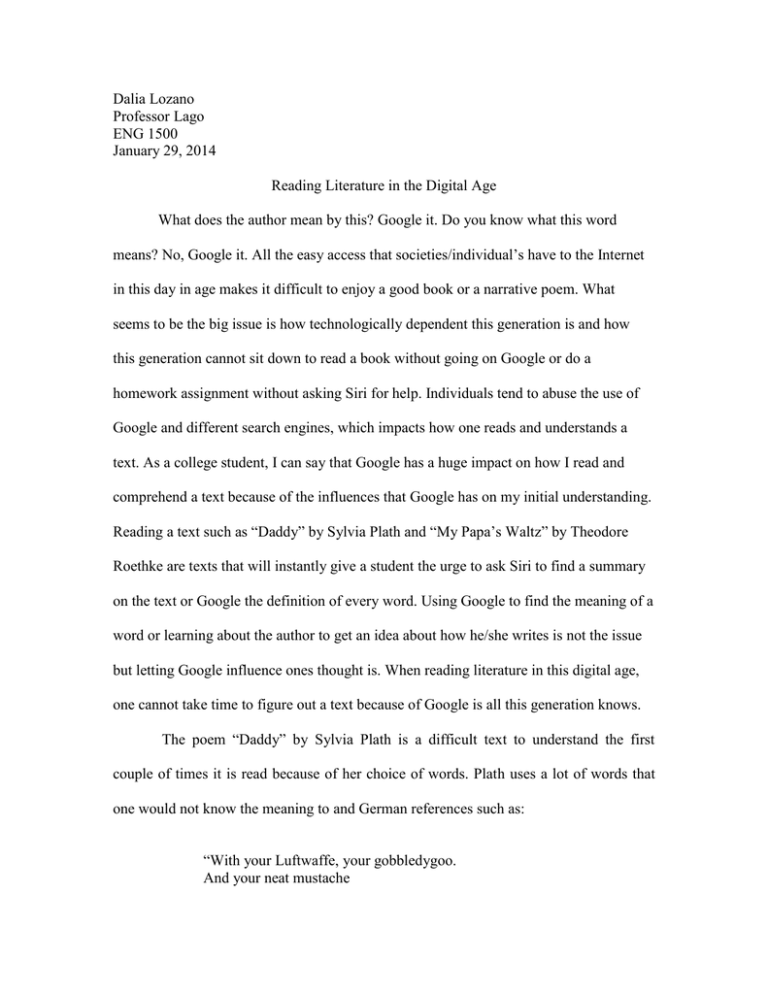
Dalia Lozano Professor Lago ENG 1500 January 29, 2014 Reading Literature in the Digital Age What does the author mean by this? Google it. Do you know what this word means? No, Google it. All the easy access that societies/individual’s have to the Internet in this day in age makes it difficult to enjoy a good book or a narrative poem. What seems to be the big issue is how technologically dependent this generation is and how this generation cannot sit down to read a book without going on Google or do a homework assignment without asking Siri for help. Individuals tend to abuse the use of Google and different search engines, which impacts how one reads and understands a text. As a college student, I can say that Google has a huge impact on how I read and comprehend a text because of the influences that Google has on my initial understanding. Reading a text such as “Daddy” by Sylvia Plath and “My Papa’s Waltz” by Theodore Roethke are texts that will instantly give a student the urge to ask Siri to find a summary on the text or Google the definition of every word. Using Google to find the meaning of a word or learning about the author to get an idea about how he/she writes is not the issue but letting Google influence ones thought is. When reading literature in this digital age, one cannot take time to figure out a text because of Google is all this generation knows. The poem “Daddy” by Sylvia Plath is a difficult text to understand the first couple of times it is read because of her choice of words. Plath uses a lot of words that one would not know the meaning to and German references such as: “With your Luftwaffe, your gobbledygoo. And your neat mustache And your Aryan eye, bright blue. Panzer-man, panzer-man, O you.”(Plath). The author also uses a lot of figurative language that is initially hard to understand such as: “Not God but a swastika So black no sky could squeak through. Every woman adores a Fascist, The boot in the face, the brute Brute heart of a brute like you.”(Plath) I primarily thought that the poem was about how the speaker had a hate so strong for her father and how she needed and wanted closure that she would never find. Plath threw me off with her words of gobbledygoo and swastika, which led me to Google. I went on Google looking for a summary to see if I had the right understanding and one of the summaries I found was “its ambivalence towards male figures does correspond to the time of its composition - she wrote it soon after learning that her husband Ted Hughes had left her for another woman.”(Grade Saver – Sylvia Plath: Poems Summary and Analysis). That didn’t seem like that was the main focus but it made me second-guess what I originally thought the poem was about. Looking up the summary did not allow me to go with what I originally thought the poem was because of the influence Google had. Google changed my thoughts on the poem by Sylvia Plath. Theodore Roethke is another author who uses thought provoking language in his poem, “My Papa’s Waltz”. The author had a sarcastic tone like, “Such waltzing was not easy”(Roethke) and “Then waltzed me off to bed”(Roethke). It is obvious the father was abusive and was not literally waltzing with the speaker of the poem. What made Roethke’s text so tempting to look up is the sarcastic tone and also some of the stanza’s can stir up different thoughts such as “My mother's countenance could not unfrown itself.” (Roethke). Does the mother get abused along with the son? Does the mother not step in to help her son because she is afraid? Why is the mother only mentioned once? Questions like these make the temptation to Google a summary harder and harder. My basic understanding of the poem was a child was being abused by his father but he still had love for his father. Using Google for this poem made me come across a biased answer, which was: “Other people believe that this poem has a hidden message of parental abuse. In my point of view, the imagery and language, the symbolism, and tone in the poem gave me the impression of the love between the father and son, not of an abusive relationship.” (Kristie Figueroa) I completely disagree with this summary because although it is obvious the son does have love for his father, the speaker of the poem makes it clear that it is an abusive relationship, regardless if the son still loves his father or not. This was a Google search that could have affected how one perceived the poem. Google is a huge factor in this generation and it affects how people read and comprehend a text. I found different types of summaries from a site like Grade Saver to a blog post and found that not every summary or definition is right but some students do not look into what the summary says. Students will read it, soak it in and assume it is the right answer. Google is easier than thinking, which is why so many of us go straight to the search engine after reading something we “kind of” don’t understand. Reading literature is slowly and surely becoming more about what someone wrote on their blog rather than what one believes and comprehends on their own. Works Cited Figueroa, Kristie. ""My Papa's Waltz"" : Analysis. BlogSpot, 7 Nov. 2007. Web. 28 Jan. 2014. "My Papa’s Waltz." By Theodore Roethke : The Poetry Foundation. N.p., n.d. Web. 26 Jan. 2014. Plath, Sylvia. "Daddy." Poets.org. Academy of American Poets, n.d. Web. 27 Jan. 2014. "Sylvia Plath: Poems Summary and Analysis." Sylvia Plath: Poems Study Guide : Summary and Analysis of "Daddy" Grade Saver, n.d. Web. 27 Jan. 2014.

